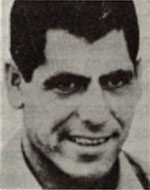Einy, Uri
Uri, son of Haton and Eliahu, was born in 1936 in Iraq and immigrated to Israel in 1949. He completed his elementary studies and high school studies at Kibbutz Maoz Haim. Uri was born into a family with many children. When he was a child he became ill, and the whole family was worried about him; But growing slightly stronger, he became a sturdy and healthy child, cheerful and always happy. From his childhood he was evident in his great kindness and willing to help anyone, as much as he could. He would always be content and find the good and the positive in everything. He never had a lot of toys and he knew how to invent games from all sorts of things he found around home. So he was always busy with himself and never bored. Uri was full of energy and could not sit still, without messing around with something. He was very social and you could always find him playing with friends, entertaining them with social games too. When he was about ten he immigrated to Israel alone as part of the Youth Aliyah. His immigration to Israel was fraught with adventures: first he traveled as part of a group, but during the road, he was caught and taken. After being released he continued the journey alone, on his own. In Israel he changed his name from Jamil to “Uri,” at the initiative of his older sister, who already lives in Israel. She chose this name to mark the light that was spreading around him wherever he went. Uri and his twin brother were sent to be educated in Kibbutz Maoz Haim as foreign children. He spent his holidays at his sister’s home in Sdot Yam. Over the years, the brother and sister had deep ties of love and closeness, mainly because she was the main family. Uri was content with what he had – he always smiled and never complained. He succeeded in finding his place in every society, and was also well absorbed among youth whose habits were foreign to him from the beginning.In kibbutz Maoz Haim, he was a member of the Hanoar Haoved Vehalomed movement. He liked to spend his spare time in the summer swimming, but mostly tried to develop his talents in the field of manual labor. He did a lot of woodwork and created very pretty things. During his school years he worked in the plantation industry. Shortly before his enlistment in the IDF, he was sent to work near the Jordan River where he was wounded by shots fired from across the border, and he was drafted into the IDF after his group was recruited. When he was well he went to fulfill his duty with good will and deep faith in the need for service and his ability to contribute to it. Uri was drafted into the Israel Defense Forces in early February 1957. After basic training and after completing his training courses for tank drivers and tank commanders, he was placed first as a tank driver and later as a non-commissioned officer of the Sherman tank. During the army training he was wounded again, but this did not damage his good spirit and his willingness to do his work faithfully. At the end of his regular service, he was assigned to a reserve unit and was called for periods of reserve duty. Uri retired from the army for some time after most of his contemporaries, and after returning to Kibbutz Maoz Haim to begin his civilian life, he encountered difficulties in absorption because most of his other friends had already found their place in the kibbutz. He decided to try another way, and with great pain and sorrow he left Maoz Haim and left for the city, and as soon as he arrived in the city he wanted to go to work and as a diligent and responsible man he had no trouble finding a place to work. In 1963, he met Penny and married her, and together they established a warm home, with joy and happiness. Uri was very devoted to his children and wife and his family broader, and always helped anyone who needed help. He helped strangers and relatives. In the Six-Day War, Uri took part in battles on the Golan Heights. For many years maintained friendships with the families of his friends, who fell in the Six-Day War. In the Yom Kippur War Uri joined his unit, which was sent to the Golan Heights. In an armor battle that took place on the 8th of Tishrei 5734 (October 8, 1973) in the El Al area, Uri’s tank was hit and he was killed. He was laid to rest in the military cemetery in Kiryat Shaul. He left behind a wife and three children – Ronen, Einat and Meirav – father, brothers and sisters. After his fall, he was promoted to sergeant.
